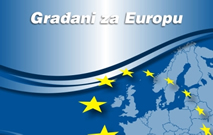Presentation of the First semi-annual report „Monitoring of the European integration process of Bosnia and Herzegovina”
 The First Semi-annual Report "Monitoring of the BiH European integration process" was presented on 22 July 2009 at the Parliamentary Assembly of Bosnia and Herzegovina. The Report was prepared by the Foreign Policy Initiative of BiH as a part of the project "Monitoring of the European Integration process of Bosnia and Herzegovina".
The First Semi-annual Report "Monitoring of the BiH European integration process" was presented on 22 July 2009 at the Parliamentary Assembly of Bosnia and Herzegovina. The Report was prepared by the Foreign Policy Initiative of BiH as a part of the project "Monitoring of the European Integration process of Bosnia and Herzegovina".
One of the main findings of the Report is that some improvement has been made in fulfilling the requirements related to foreign trade, justice and security area ie. steps towards visa liberalisation. Progress was also noted in assuming the international obligations related to the control and demolition of mass destruction and small weapons as well as in ratifying the instruments for the protection of intellectual property.
It was also emphasised that the process of using the IPA funds for the Cross-border cooperation projects started and that Bosnia and Herzegovina is fulfilling its obligation from the Stabilisation and Association Agreement and the Interim Agreement related to current payments and financial cooperation.
Ambassador Dimitris Kourkoulas, Head of European Commission Delegation to Bosnia and Herzegovina, participated in the panel discussion and stated:
„We still believe that Bosnia and Herzegovina has enough time to fulfil all the requirements and deliver all the necessary documents required by the Stabilisation and Association Agreement. We still believe that you will take the opportunity of the European integration momentum to make further positive developments. I don't think the government should use the problems it is facing at the moment to avoid making efforts for making changes in this country".
Mr Kourkoulas stated that "constitutional reform is not a precondition for the membership in the European Union, but we believe that this reform is a necessary part of this process".
"We are all aware that the constitutional issue in this country is very complex and that is why the European Union will strengthen its presence after the transition of the OHR. In the meantime, I am convinced that a lot of accomplishments can be made provided that there is a good political will. We have already taken in consideration the accomplishments made by consensus in the past few months, despite the difficulties existing in the Constitution of BiH.
For instance, with regards to the Visa liberalisation process, a number of laws that were put on hold for a long time due to political blocking, were suddenly adopted because the responsible ministries at state and entity levels met, discussed and agreed. Those changes are possible", stated Mr Kourkoulas.
Unfortunately, the late progress made in the area of visa liberalisation process, did not achieve the required result and BiH remained outside the White Schengen list. Mr Kourkoulas also commented on this issue.
„Your country risks to be the only country in the region without liberalised visa regime and that is why many took the opportunity of the current situation to accuse the European Commission of not supporting it. In the past six years we have invested more than 40 million euro of the EU tax payers' money in order to assist this country in fulfilling all the conditions for visa liberalisation. We take this issue very seriously and therefore invested a lot of financial assistance and efforts. As soon as the biometric passport system starts functioning, the European Commission is prepared to make another review and this, in parallel with the fulfilment of other outstanding requirements, we would be happy to make another proposal to lift the visa restrictions also for Bosnia and Herzegovina", stated Dimitris Kourkoulas, Head of EC Delegation to BiH.
Mr Bosse Hedberg, Ambassador of the Embassy of the Kingdom of Sweden in BiH, representing EU Presidency, emphasised that in case that the current situation is maintained, the Bosniaks will unfortunately have no possibility of free travelling.
„Laws on dual citizenship of Serbia, Croatia and Bosnia and Herzegovina, allow citizens to have several passports. The negative consequence is that a part of the population here cannot obtain passports of the other countries. However, this is not the decision of the European Union or the European Commission, but a consequence of the current laws. It is a part of the situation that people need to understand. It is a consequence of such laws in those countries" stated ambassador Hedberg.
During the debate, Halid Genjac, Chairman of the Joint Commission for European integration process in the BiH Parliamentary Assembly as well as Denisa Sarajlić-Maglić, Foreign Policy Imitative of BiH and Željko Komšić, Chairman of the BiH Presidency, addressed the participants.


